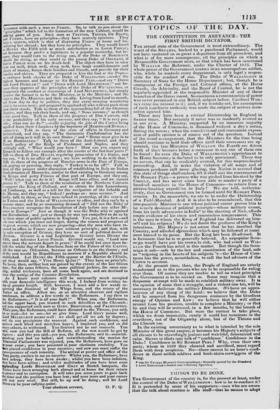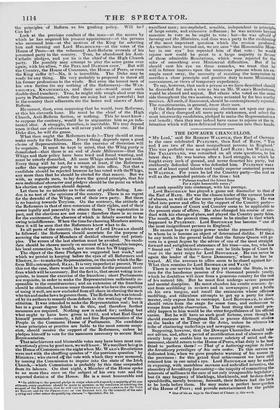THINGS TO BE DONE.
THE Government of the country is, for the present at least, under the control of the Duke of WELLINGTON : how is he to conduct it? It is pretended by some of his supporters—men who are aware that the talk about reaction is idle stuff—that he means to adopt
the principles of Reform as his guiding policy. Will be ?
Can he?
Look at the previous conduct of the man—at the means by
which he has acquired his present appointment—at the persons who surround him—at the motives of the King for selecting him and turning out Lord MELBOURNE—at the votes of the House of Peers—at the vehement Anti-Reform avowals of his presumed party in the country. True, he abandoned his Anti- Catholic pledges, and yet he is the chief of the High Church party. He possibly may attempt to play the same game over again, with his allies, " the PEEL and DAWSON crew." But will the Country, the House of Commons, the House of Peers, or even the King suffer it?—No, it is incredible. The Duke may be ready for any thing. He very probably is prepared to throw all his former professions to the winds. But even the honest men of his own faction (to say nothing of the Reformers)—the WIN- CRILSEAS, KNATCHBULLS, and their set—would scout such double-dyed treachery. True, he might ride rough-shod over this party in Parliament, where they are noisy but not powerful ; but in the country their adherents are the bones and sinews of Anti-
Reform.
He cannot, then, even supposing that he would, turn Reformer, at this his eleventh hour. He must be the chief of the High Church, Anti-Reform faction, or nothing. This he must know : to suppose the contrary, would be to stigmatize him as.an infa- tuated idiot. A struggle, therefore, is inevitable. We may depend upon it that our adversaries will never yield without one. If the Duke dies, he will die game. What then ought the Reformers to do ?—They should at once
make ready for the Elections. Every thing depends upon a good choice of Representatives. Here the exercise of discretion will be requisite. It must be kept in mind, that the Whig party is demolished—that there is an end of Juste Milieuism—that the Whigs and their policy have been tried and found wanting, and must be utterly discarded. All mere Whigs should be put aside. Every thing will be lost, for a season at least, if the Reformers suffer this unpopular party to wriggle into office. Not that a candidate should be rejected because he has voted with theWhigs, any more than that he should be elected for that reason. But we wish, as regards men, to lay down the grand principle, that his awn individual character and pledges should be the point on which his election or rejection should depend.
Let there be no mistake as to the state of public feeling. Lon- don is no test of the opinions of the country. There is no regret for the downfal of the Whigs, out of their own party. But there is no leaning towards Toryism. On the contrary, the attitude of the Reformers is that of men conscious of their rights, and of their power legally and peaceably to obtain them. The registration is past, and the elections are not come : therefore there is no cause for the excitement, the absence of which is falsely asserted to be owing to indifference. When the time for choosing Members arrives, then it will be seen that the Reformers know what to do.
In all parts of the country, the advice of Lord DURHAM should be followed : the Reformers should associate for the purpose of securing the return of Members of decided character and princi- ples. The errors of the last election must be avoided. No candi- date should be chosen merely on account of his agreeable temper, his local connexion, his wealth, any more than his Whiggism.
The object of the three Pledges we suggested last week,* and which we persist in keeping before the eyes of all Reformers and Electors, is—to make the Representation, on the scale which the Re- form Bill contemplated, REAL. It is very imperfect at present. Were
this not the case, there would be no occasion for the personal sacri- fices which will be necessary. But the fact is, that secret voting is re-
quisite, to insure the exercise of the franchise; short Parliaments are requisite, in order to make the Representatives sufficiently re- sponsible to the constituencies; and an extension of the franchise should be obtained, because many thousands who have the capacity of using it well, are now excluded from all share in electing the men who tax and make laws to govern them. The Reform Act was intend- ed by its authors to remedy these defects in the working of the con- stitution. It was intended to make the Representation real ; but it has in a great degree failed to do this, and therefore further measures are required. Nothing new is asked for; nothing but what ought to have been given in 1832, and what Earl GREY himself promised—namely, a full and free Representation of the People in the Commons House of Parliament. No candidate whose principles or practice are liable to the most remote suspi- cion, should receive the support of the Reformers, unless he pledges himself to vote for the measures necessary to secure Real Representation. That mischievous and blameable votes may have been most con-
scientiously given by good men, we well know. We recollect being in the House of Commons on the night when Mr. WARD'S Resolutions were met with the shuffling quietus of " the previous question " by Ministers ; who staved off the vote with which they were menaced, by issuing the Commission to inquire into the state of the Irish Church,—which Commission is probably by this time suspended from its labours. On that night, a Member of the House spoke to us more than once on the subject of his own vote and the expected decision of the House. He is a most honourable and ••• In addition to the general pledge to resign when called upon ka a majority of Ms con- stituents, every candidate should be made to promise, as the condition of receiving the support of the Reformers, that he will vote for TRIENNIAL Pa tittA nears, for the VOTE BY BALI OT, and for the PERFFCTING or THE REFORM ACT, lzig the removal of the rate- miitig and other minor disqualifying clauses."—Spectator, No. 15.
excellent man ; accomplished, sensible, independent in principle, of large estate, and extensive influence ; he was anxious beyond
measure to vote as he ought to vote : but—he was afraid of turning out the Ministers, and thus was a party to the cushioning of the most important question which the session produced, As-matters have turned out, we are sure " the Honourable Mem- ber in our eye" has repented him of that vote : he would rejoice now could he point to a large majority in favour of those admirable Resolutions, which were rejected for the sake of smoothing over Ministerial difficulties. But if he should cast his eye on these remarks, we trust that he will in future impress upon the numerous persons whom his ex- ample must sway, the necessity of resisting the temptation to sacrifice a clear principle and positive duty to mere Ministerial convenience, or views of temporary expediency. To say, however, that such a person as we have described should be discarded for such a vote as his on Mr. WARD'S Resolutions, would be absurd and unjust. But others who voted on the same side throughout the two sessions, were actuated by far less worthy motives. All such, if discovered, should be contemptuously rejected. The constituencies, in general, know :hell-men.
If the Reformers at the ensuing elections act upon our prin- ciple; if they disregard all mere party nicknames, and select the most trustworthy candidates, pledged to make the Representations real benefit; then they may indeed have cause to rejoice at the in fatuation which will have delivered their enemies into their hands.





















 Previous page
Previous page